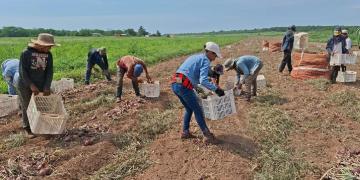EEUU: Idaho potato industry awaits results of litchi tomato field trials
Idaho’s potato industry is awaiting the results of the first field tests of a trap crop that researchers hope can help eliminate pale cyst nematode in infested potato fields.

The first Idaho field tests of a so-called trap crop that researchers hope can significantly reduce pale cyst nematode numbers in infested potato fields went well, at least from an agronomic standpoint.
Now the state’s potato industry is awaiting the release of research results that will show how well litchi tomato fared in actually reducing PCN numbers.
Those results are expected to be released in December or January, said Lloyd Knight, the Idaho State Department of Agriculture’s plant industries division administrator.
“If it does work like they think it will, it would be a really good solution to this problem,” said Oakley potato grower Randy Hardy.
PCN, a tiny worm that can reduce potato yields if it’s present in high numbers, was first detected in Idaho in 2006 and 26 fields encompassing 2,897 acres are infested with PCN. Those fields in East Idaho, along with another nearby 7,734 acres which have been associated with the infested fields, are regulated under a federal quarantine.
Litchi tomato, which is in the same plant family as potatoes, stimulates nematode eggs to hatch in the soil but it does not support nematode feeding or reproduction.
In greenhouse trials, litchi tomato greatly reduced the amount of PCN cysts on succeeding potato crops, according to information sent to the Capital Press by USDA Animal and Plant Health Inspection Service officials.
“Non-field trial research led by the University of Idaho resulted in litchi tomato almost entirely eliminating reproduction of pale cyst nematode,” Rhonda Santos, an APHIS public affairs official, said in an email.
In greenhouse experiments, the use of litchi tomato reduced nematode cyst numbers by 70-95 percent in a succeeding potato crop. By contrast, according to APHIS, cyst numbers increased by 340 percent when potatoes were planted following potatoes.
Santos said researchers would learn more in the weeks to come about how this year’s field trials fared but she said, “If we get the results we expect, we may support expanded use of litchi tomato as another effective tool to eliminate (PCN).”
Because Idaho considers litchi tomato an invasive species, the state’s PCN program has to obtain a detailed permit from ISDA to grow the plant to ensure it doesn’t spread.
“Everything in the permit having to do with the project went according to plan,” Knight said. “It worked exactly as we hoped it would. I look forward to hearing what they got out of that research.”
The field trials included three infested fields covering a total of almost 120 acres.
Santos said researchers learned a lot agronomically about how to grow the plant in Idaho, including “how to prepare and plant the litchi tomato seed for rapid and consistent germination and that it can be drilled or planted like grain seed, using equipment that the growers already have.”
She said the plant grew better than expected in Southeast Idaho’s cooler, drier climate “but early season weed control is important as some weeds initially grow more quickly than the litchi tomato.”
Fuente: http://www.capitalpress.com/Research/20151202/




